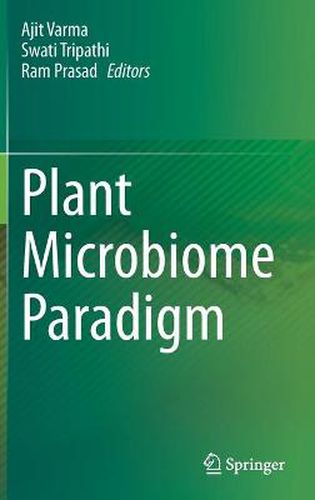Readings Newsletter
Become a Readings Member to make your shopping experience even easier.
Sign in or sign up for free!
You’re not far away from qualifying for FREE standard shipping within Australia
You’ve qualified for FREE standard shipping within Australia
The cart is loading…






This title is printed to order. This book may have been self-published. If so, we cannot guarantee the quality of the content. In the main most books will have gone through the editing process however some may not. We therefore suggest that you be aware of this before ordering this book. If in doubt check either the author or publisher’s details as we are unable to accept any returns unless they are faulty. Please contact us if you have any questions.
This book provides a comprehensive overview of the current state of knowledge on plant-microbiome interactions and associations. It covers all major mechanistic approaches used to investigate microbes’ impacts on plant growth promotion, disease control and health.
The industrial manufacture of nitrogen currently accounts for roughly 2% of the world’s total energy consumption. Microbial products are expected to reduce the need for costly fertilizers, as well as chemical pesticides and fungicides. While beneficial microorganisms are increasingly being used in agriculture, abiotic and biotic stresses such as heat, drought, cold, and salt can quickly kill or render them useless in the field. However, discovering new and better treatments is a lengthy process due to the considerable microbial diversity found in soils.
Researchers have now proposed using biotechnological approaches to accelerate the process of microbial technology development. The fact that plant-associated microbes stimulate plant growth and development is well known, as the examples of rhizobia and mycorrhizal fungi show. The mechanisms by which these microorganisms maintain plant growth include the production of phytohormones, fixation of nitrogen, and the mobilization of phosphorus and minerals. The plant microbiome is also involved in pathogen suppression, and especially the root microbiome acts as a protective shield against soil-borne pathogens.
A special feature of this book is its multidisciplinary approach, spanning from plant microbiology/biocontrol, fungal and bacterial endophytes, plant physiology, to biochemistry, proteomics and genomics. It is ideally suited for researchers and student of agri-biotechnology, soil biology and fungal biology.
$9.00 standard shipping within Australia
FREE standard shipping within Australia for orders over $100.00
Express & International shipping calculated at checkout
This title is printed to order. This book may have been self-published. If so, we cannot guarantee the quality of the content. In the main most books will have gone through the editing process however some may not. We therefore suggest that you be aware of this before ordering this book. If in doubt check either the author or publisher’s details as we are unable to accept any returns unless they are faulty. Please contact us if you have any questions.
This book provides a comprehensive overview of the current state of knowledge on plant-microbiome interactions and associations. It covers all major mechanistic approaches used to investigate microbes’ impacts on plant growth promotion, disease control and health.
The industrial manufacture of nitrogen currently accounts for roughly 2% of the world’s total energy consumption. Microbial products are expected to reduce the need for costly fertilizers, as well as chemical pesticides and fungicides. While beneficial microorganisms are increasingly being used in agriculture, abiotic and biotic stresses such as heat, drought, cold, and salt can quickly kill or render them useless in the field. However, discovering new and better treatments is a lengthy process due to the considerable microbial diversity found in soils.
Researchers have now proposed using biotechnological approaches to accelerate the process of microbial technology development. The fact that plant-associated microbes stimulate plant growth and development is well known, as the examples of rhizobia and mycorrhizal fungi show. The mechanisms by which these microorganisms maintain plant growth include the production of phytohormones, fixation of nitrogen, and the mobilization of phosphorus and minerals. The plant microbiome is also involved in pathogen suppression, and especially the root microbiome acts as a protective shield against soil-borne pathogens.
A special feature of this book is its multidisciplinary approach, spanning from plant microbiology/biocontrol, fungal and bacterial endophytes, plant physiology, to biochemistry, proteomics and genomics. It is ideally suited for researchers and student of agri-biotechnology, soil biology and fungal biology.